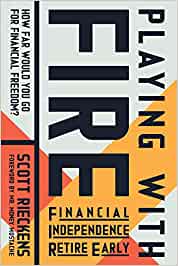
Financial literacy is the key to financial success. The world of finance can be scary to many people since it is loaded with complex jargon and concepts that aren't easily grasped. Thankfully, financial literacy is within everyone's reach, regardless of their education level. Let's talk about how improving your financial literacy can make you wealthy.
What is Financial Literacy?
Financial literacy is a critical life skill because it gives us the power to make informed decisions about our money. It equips us with the knowledge and skills we need to effectively manage our finances, including budgeting, saving, borrowing, and investing. This means we're in a better position to meet our financial objectives and establish financial stability.
Simply put, financial literacy is the difference between living paycheck to paycheck buying the things you need, as opposed to developing wealth that works for you, which is why it is so critical.
The basic financial principles include:
- Budgeting
- Saving
- Planning for emergencies
- Manage your debt
- Improve your credit score
- Retirement planning
- Investments
Because finance is important in society today, a person's long-term financial success can be severely impacted by a lack of financial literacy. Being financially illiterate can lead to various problems, including a higher chance of accumulating unsustainable debt burdens due to poor spending decisions or a lack of long-term planning. Poor credit, foreclosure, bankruptcy, and other adverse repercussions can occur as a result of this.
With financial literacy, you can:
- Build wealth
- Protect yourself in the event of an emergency
- Afford the things you want the most
- Achieve your goals
- Protect and care for your family
- Live life without financial stress
- Retire comfortably
It's time to become financially literate if you're a slave to your paycheck and have no savings to fall back on.
Read further to learn a few reasons why improving your financial literacy can make you wealthy.
1. Protect Yourself in an Emergency
When planning for the future, you need to expect emergencies to happen, as they're inevitable. An emergency fund can help in this situation. Nobody wants a crisis to occur, but it is expensive and becomes a stressful situation when it does.
You should aim to have three to six months' worth of emergency funds to protect yourself or your family in the event of a job loss, major medical incident, or other huge and unexpected expense.
Even if you can only afford to save $10 a week, the savings can build up quickly. Being financially literate means you have the knowledge to plan for future surprises, and you'll be ready for them when they come!
2. Achieve Your Financial Goals Through Saving
Long-term, short-term, and intermediate financial goals are the building blocks of a comprehensive financial strategy. The greatest financial goals are those that are in line with your personal beliefs and ambitions. Financial goals are measurable and specific that, when achieved, get you closer to your ideal future. They are not to be mistaken with a budget or financial plan.
Setting reasonable financial goals necessitates a level of financial literacy that is relatively high. It's essential to grasp the basics of money, such as making a budget, how your taxes work, the differences between various investments, and other personal finance issues that affect your wellbeing.
Achieving your financial goals will include a commitment to saving. That is one of the reasons why saving is such an essential aspect of any money management strategy.
Wealth is built through spending less of your income and putting your savings into an interest-yielding bank account, or investing, to keep your money safe and allows you to grow it over time.
3. Protect and Care for Your Family
Would your family be able to make ends meet if you weren't there? Would they be able to stay in your home, or would they be forced to leave? One of the most effective ways to safeguard the people you care about is to purchase life insurance.
Financially literate people understand the importance of taking care of their family should anything happen to them, such as in the event of death. Preparing for a time when you aren't around is important and wise.
4. Understanding Your Taxes
Understanding the various types of taxation and how they affect an individual's net income is essential for financial literacy. Each source of income gets taxed differently, whether from a job, an investment, a rental property, an inheritance, or something unexpected.
Financial literacy teaches you to understand your earnings and how they get taxed. One's income level determines the federal tax rates in Canada. In addition to federal tax rates, you also need to consider province and territorial tax rates.
There are tax implications in numerous aspects of wealth management. Integrating potential tax benefits into your plans may be possible, but certain actions may also have adverse tax effects.
Furthermore, taxes should not be the only aspect to consider when deciding on the best investments for your situation, and it's critical to examine the after-tax rate of return when considering tax-efficient investments.
5. Retire Comfortably
Financial literacy is closely linked to retirement planning. This outcome has been seen in several other countries, and Canadian estimates are comparable to those obtained in other countries.
This is important in the Canadian context due to the low level of financial literacy, especially some of the more affluent Canadians (others with higher education and money), who might have to depend on voluntary savings programs in retirement to fund their usual level of spending.
According to several studies, people who plan ahead for their retirement tend to have greater pension wealth. Other forms of actual behaviour that can boost retirement resources, such as avoiding consumer credit, participating in the stock market, not borrowing against pension accounts, or investing in on-the-job training, are all influenced by financial literacy.
In comparison to working Canadians, retirees require a different level of financial literacy. Managing finances without a steady paycheck demands a unique set of skills and tools.
6. Your Credit Score
One of the most important reasons to improve your financial literacy is improving and safeguarding your credit score, which is an integral part of your financial life. Your credit score is a robust measure of your financial health.
You start your credit history once you start spending money with credit cards, loans and paying bills regularly. This record of how much you owe, how often you borrow, and how quickly you repay it can follow you throughout your life.
With a strong credit score, you can qualify for lower interest rates on credit cards and loans, as well as credit cards with appealing and money-saving advantages and a variety of financial product offerings, allowing you to pick the best deal.
Conclusion
Financial literacy is important because it provides people with a basic understanding of financial concepts that can help them make better financial decisions in the real world. They'll be better equipped to manage their money, make wise judgments, and maintain healthy spending and budgeting habits with this information, which will contribute to financial wellness over time.
Financial literacy entails an awareness of financial principles and money management abilities to make informed financial decisions. It'll determine whether you have control over your money or your money has power over your life.
It offers you the assurance that you can manage your money correctly, avoid debt, build your money for both long and short-term goals, and plan for retirement.
Today, you can begin with Hardbacon‘s free library of financial literacy resources to learn about debt, saving, budgeting, investing, and more.




















About The Author: Arthur Dubois
Passionate about personal finance and financial technology, Arthur Dubois is a writer and SEO specialist at Hardbacon. Since his arrival in Canada, he’s built his credit score from nothing.
Arthur invests in the stock market but doesn’t pay any fees because he uses National Bank Direct Brokerage online broker and Wealthsimple’s robo-advisor. He pays for his subscriptions online with his KOHO prepaid card, and uses his Tangerine credit card for most of his in-store purchases. When he buys bitcoins, it’s with the BitBuy online platform. Of course it goes without saying that he uses the Hardbacon app so that he can manage all of his finances from one convenient place.
More posts by Arthur Dubois